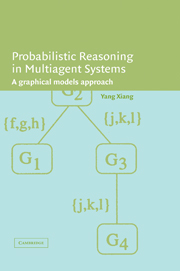Book contents
- Frontmatter
- Contents
- Preface
- 1 Introduction
- 2 Bayesian Networks
- 3 Belief Updating and Cluster Graphs
- 4 Junction Tree Representation
- 5 Belief Updating with Junction Trees
- 6 Multiply Sectioned Bayesian Networks
- 7 Linked Junction Forests
- 8 Distributed Multiagent Inference
- 9 Model Construction and Verification
- 10 Looking into the Future
- Bibliography
- Index
8 - Distributed Multiagent Inference
Published online by Cambridge University Press: 31 August 2009
- Frontmatter
- Contents
- Preface
- 1 Introduction
- 2 Bayesian Networks
- 3 Belief Updating and Cluster Graphs
- 4 Junction Tree Representation
- 5 Belief Updating with Junction Trees
- 6 Multiply Sectioned Bayesian Networks
- 7 Linked Junction Forests
- 8 Distributed Multiagent Inference
- 9 Model Construction and Verification
- 10 Looking into the Future
- Bibliography
- Index
Summary
Chapter 7 has presented compilation of an MSBN into an LJF as an alternative dependence structure suitable for multiagent belief updating by concise message passing. Just as in the single-agent paradigm in which the conditional probability distributions of a BN are converted into potentials in a junction tree model, the conditional probability distributions in an MSBN need to be converted into potentials in the LJF before inference can take place. This chapter presents methods for performing such conversions and passing potentials as messages effectively among agents so that each agent can update belief correctly with respect to the observations made by all agents in the system.
Section 8.2 defines the potential associated with each component of an LJF and describes their initialization based on probability distributions in the original MSBN. Section 8.3 analyzes the topological structures of two linkage trees over an agent interface computed by two adjacent agents through distributed computation. This analysis demonstrates that, even though each linkage tree is created by one of the agents independently, the two linkage trees have equivalent topologies. This result ensures that the two agents will have the identical message structures when they communicate through the corresponding linkage trees. Sections 8.4 and 8.5 present direct interagent message passing between a pair of agents. The effects of such message passing are formally established. The algorithms for multiagent communication through intra- and interagent message passing are presented in Section 8.6.
Information
- Type
- Chapter
- Information
- Probabilistic Reasoning in Multiagent SystemsA Graphical Models Approach, pp. 182 - 214Publisher: Cambridge University PressPrint publication year: 2002
